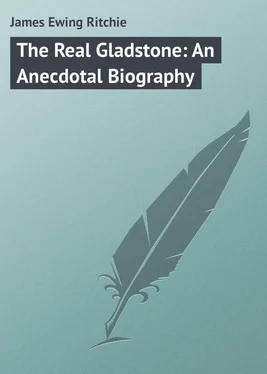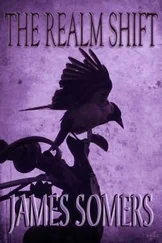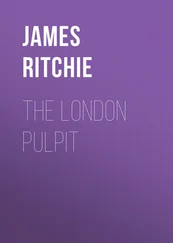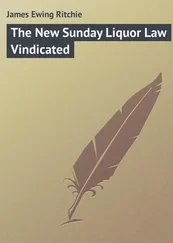James Ritchie - The Real Gladstone - An Anecdotal Biography
Здесь есть возможность читать онлайн «James Ritchie - The Real Gladstone - An Anecdotal Biography» — ознакомительный отрывок электронной книги совершенно бесплатно, а после прочтения отрывка купить полную версию. В некоторых случаях можно слушать аудио, скачать через торрент в формате fb2 и присутствует краткое содержание. Жанр: foreign_prose, на английском языке. Описание произведения, (предисловие) а так же отзывы посетителей доступны на портале библиотеки ЛибКат.
- Название:The Real Gladstone: An Anecdotal Biography
- Автор:
- Жанр:
- Год:неизвестен
- ISBN:нет данных
- Рейтинг книги:4 / 5. Голосов: 1
-
Избранное:Добавить в избранное
- Отзывы:
-
Ваша оценка:
- 80
- 1
- 2
- 3
- 4
- 5
The Real Gladstone: An Anecdotal Biography: краткое содержание, описание и аннотация
Предлагаем к чтению аннотацию, описание, краткое содержание или предисловие (зависит от того, что написал сам автор книги «The Real Gladstone: An Anecdotal Biography»). Если вы не нашли необходимую информацию о книге — напишите в комментариях, мы постараемся отыскать её.
The Real Gladstone: An Anecdotal Biography — читать онлайн ознакомительный отрывок
Ниже представлен текст книги, разбитый по страницам. Система сохранения места последней прочитанной страницы, позволяет с удобством читать онлайн бесплатно книгу «The Real Gladstone: An Anecdotal Biography», без необходимости каждый раз заново искать на чём Вы остановились. Поставьте закладку, и сможете в любой момент перейти на страницу, на которой закончили чтение.
Интервал:
Закладка:
Of colonial Bishops Mr. Gladstone had a high admiration. In 1876 he wrote: ‘It is indeed, I fear, true that a part – not the whole – of our colonial episcopate have sunk below the level established for it five-and-thirty years ago by the Bishops of those days. But how high a level it was! and how it lifted the entire heart of the Church of England!’
Here it is as well to give some further particulars as to Mr. Gladstone’s action with regard to Church matters. In 1836 Mr. Gladstone left the Church Pastoral Aid Society, of which he had become one of the vice-presidents, in consequence of an attempt to introduce lay agency. At all times he was ready to guard and vindicate the religious character of his alma mater. On one occasion Lord Palmerston had expressed a reasonable dislike of a system which compelled the undergraduates ‘to go from wine to prayers, and from prayers to wine.’ Mr. Gladstone, in reply, said he had a better opinion of the undergraduates who had been so lately his companions. He did not believe that even in their most convivial moments they were unfit to enter the house of prayer. Mr. Gladstone was one of a committee which met at the lodgings of Mr. (afterwards Sir Thomas) Acland in Jermyn Street, which led to the formation of Boards of Education for the different dioceses, and to the establishment of training colleges, with the double aim of securing religious education for the middle classes and the collegiate education of the schoolmasters.
Mr. Gladstone’s ecclesiastical leanings soon brought him back to Parliamentary life, in connection with Archbishop Tait’s Public Worship Regulation Bill. The grounds of his opposition he affirmed in the following resolutions:
‘1. That in proceeding to consider the grounds for the Regulation of Public Worship this House cannot do otherwise than take into view the lapse of more than two centuries since the enactment of the present rubrics of the Common Prayer-Book of the Church of England; the multitude of particulars combined in the conduct of Divine service under their provisions; the doubt occasionally attaching to their interpretation, and the number of points they are thought to have left undecided; the diversities of local custom which under these circumstances have long prevailed; and the unreasonableness of proscribing all varieties of opinion and usage among the many thousands of congregations of the Church distributed throughout the land.
‘2. That this House is therefore reluctant to place in the hands of any single Bishop – on the motion of one or more persons, however defined – greatly increased facilities towards procuring an absolute ruling of many points hitherto left open and reasonably allowing of diversity, and thereby enforcing the establishment of an inflexible rule of uniformity throughout the land, to the prejudice in matters indifferent of the liberty now practically existing.
‘3. That the House willingly acknowledges the great and exemplary devotion of the clergy in general to their sacred calling, but is not on that account the less disposed to guard against the indiscretions or thirst for power of other individuals.
‘4. That this House is therefore willing to lend its best assistance to any measure recommended by adequate authority, with a view to provide more effectual security against any neglect of, or departure from, strict law which may give evidence of a design to alter, without the consent of the nation, the spirit or the substance of revealed religion.
‘5. That in the opinion of this House it is also to be desired that the members of the Church having a legitimate interest in her services should receive ample protection against precipitate and arbitrary changes of established customs by the sole will of the clergyman and against the wishes locally prevalent amongst them, and that such protection does not appear to be afforded by the provisions of the Bill now before the House.
‘6. That the House attaches a high value to the concurrence of Her Majesty’s Government with the ecclesiastical authorities in the initiative of legislation affecting the Established Church.’
In moving these resolutions, Mr. Gladstone’s speech was of the highest interest and importance; ‘but never, perhaps, in his long career,’ writes the biographer of Archbishop Tait, ‘did his eloquence so completely fail to enlist the sympathy even of his own supporters, and the resolutions were withdrawn.’ The Bill, opposed by Dr. Pusey on one side and Lord Shaftesbury on the other, was carried in a modified form. Eye-witnesses have described the debate on the second reading: ‘The House, jaded with a long and anxious sitting, was eager to divide. A clear voice was heard above the clamour. It was Mr. Hussey Vivian, an old and tried friend of Mr. Gladstone. He rose to warn him not to persist in his amendments; not twenty men on his own side of the House would follow him into the Lobby. Already deft lieutenants, mournful of aspect, had brought slips of paper to their chief, fraught, it seemed, with no good tidings. When the Speaker put the question, there was no challenge for a division. Amid a roar of mixed cheers and laughter, the six resolutions melted away into darkness.’
Sir William Harcourt was one of Mr. Gladstone’s principal opponents in the course of the debate. In Committee there was rather an amusing passage of arms between Mr. Gladstone and his old Attorney-General. Sir William espoused the Bill strongly, and implored Mr. Disraeli to come to the rescue. ‘We have,’ he said, ‘a leader of the House who is proud of the House of Commons, and of whom the House of Commons is proud.’ A provision had been introduced into the Bill which would have overthrown the Bishops’ right of veto on proceedings to be instituted in the New Court. This provision Mr. Gladstone vehemently opposed, and quoted from the canonist Van Espero. Sir William ridiculed the quotations, and accused Mr. Gladstone at the eleventh hour of having come back to wreck the Bill. Two days after he again attacked Mr. Gladstone, and quoted authorities in support of his views. Mr. Gladstone’s reply was complete.
At this time Mr. Gladstone was much occupied with his favourite ecclesiastical subjects. In an article on ‘Ritual and Ritualism,’ contributed to the Contemporary Review , he contended for the lawfulness and expediency of moderate ritual in the services of the Church of England. He returned to Church questions in a second article entitled ‘Is the Church of England worth Preserving?’ – a question which, of course, he answered in the affirmative. In the course of his remarks he created a perfect storm of indignation on the part of the Roman Catholics. To meet this Mr. Gladstone published a pamphlet called ‘The Vatican Decrees in their Bearing on Civil Allegiance.’ One hundred and twenty thousand copies of the pamphlet were sold in a few weeks, and the press was filled with replies. Mr. Gladstone returned to the charge in a pamphlet entitled ‘Vaticanism,’ in which he contended that in theory the Papal Infallibility was inconsistent with the requirements of civil allegiance. In connection with this subject, let it be briefly stated that in 1880, when Mr. Gladstone returned to power, one of the first things to be settled was the Dissenters’ Burial Bill, a subject first brought before the House of Commons by Sir Morton Peto in 1861. The Bill was finally piloted through the House of Commons by Mr. Osborne Morgan, Judge Advocate. Perhaps by this time Mr. Gladstone had become tired of ecclesiastical difficulties. In a letter to the Lord Chancellor respecting fresh legislation on the part of the Archbishop of Canterbury, Mr. Gladstone wrote: ‘The thing certainly could not be done by the authority of the Cabinet, were the Cabinet disposed to use it, of which at present I can say nothing.’
Читать дальшеИнтервал:
Закладка:
Похожие книги на «The Real Gladstone: An Anecdotal Biography»
Представляем Вашему вниманию похожие книги на «The Real Gladstone: An Anecdotal Biography» списком для выбора. Мы отобрали схожую по названию и смыслу литературу в надежде предоставить читателям больше вариантов отыскать новые, интересные, ещё непрочитанные произведения.
Обсуждение, отзывы о книге «The Real Gladstone: An Anecdotal Biography» и просто собственные мнения читателей. Оставьте ваши комментарии, напишите, что Вы думаете о произведении, его смысле или главных героях. Укажите что конкретно понравилось, а что нет, и почему Вы так считаете.












